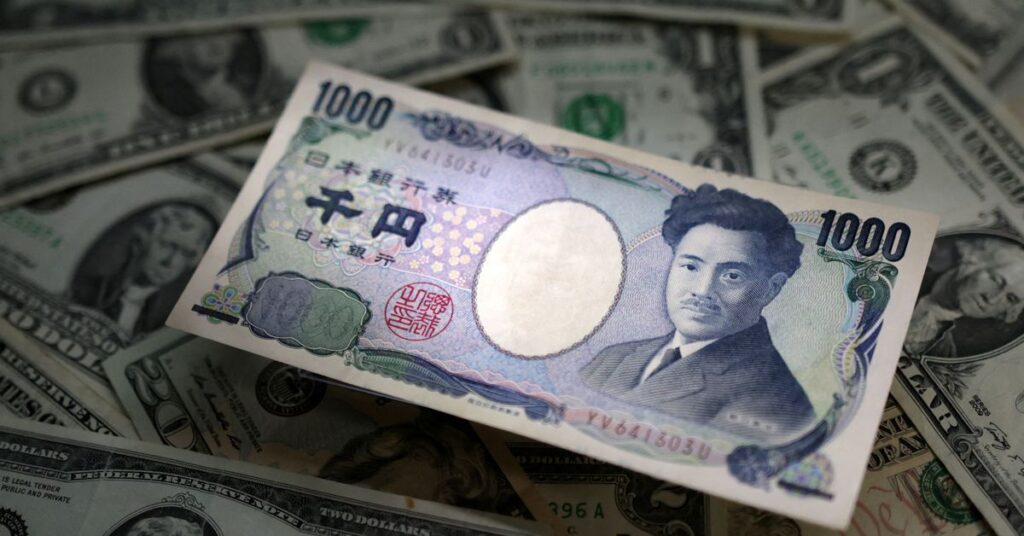SINGAPORE, July 31 (Reuters) – The yen softened on Monday, extending losses from a volatile session at the end of last week after the Bank of Japan (BoJ) loosened its grip on interest rates, but it remained on track for its first monthly gain against the dollar since March.
In Europe, the euro firmed after data showed economic growth nudged higher and inflation ticked lower.
There is plenty on the agenda in the coming week, with the Bank of England meeting on Thursday, and U.S. payrolls on Friday, the first of several data points that will shape the Federal Reserve’s September interest rate decision.
The dollar rose on Monday to 142.5 yen, its highest in three weeks in European trading, and was last up 0.87% at 142.4.
The Japanese currency went into a tailspin on Friday as traders tried to determine the implications of the BoJ’s move to maintain ultra-low rates while making its bond yield curve control (YCC) policy more flexible and loosening its defence of a long-term rate cap.
The dollar eventually ended the Friday session with a 1.2% gain against the yen, though that was after it had slid 1% to a session-low of 138.05 yen.
The BoJ’s policy of keeping yields pinned down has weighed heavily on the Japanese currency for the past year, and fresh intervention on Monday showed it could continue to do so.
Japan’s benchmark 10-year government bond yield surged to a nine-year high, spurring the central bank to conduct additional purchase operations to slow its rise. The move “has likely surprised some market participants and encouraged yen selling overnight”, MUFG analysts said in a Monday note.
“At the same time, the yen’s failure to sustain gains following the BoJ’s policy announcement last week could also reflect the message from the BoJ that it is not in a hurry to begin raising interest rates,” they added.
Elsewhere in Asia, data on Monday showed China’s manufacturing activity fell for a fourth straight month in July, though the China-exposed Australian dollar and Chinese shares were buoyed by news of further measures to spur the country’s sputtering economic recovery.
The Aussie was last up 0.9% at $0.6707, and the offshore yuan was steady at 7.1531 per dollar, drawing some support from an announcement from China’s State Council on Monday on measures to restore and expand consumption in the automobile, real estate and services sector.
FED HIKES DONE?
The U.S. dollar was headed for a monthly loss on the prospect that the Federal Reserve’s aggressive rate-hike cycle – a key driver of the dollar’s strength – could have concluded with last week’s 25-basis-point increase.
The dollar index was last flat at 101.69, but was eyeing a monthly decline of roughly 1%, extending its loss to a second straight month.
The dollar is heading for its first monthly loss against the yen since March, and its second successive monthly loss against the euro and pound.
Data on Friday showed that the annual U.S. inflation rate rose in June at its slowest pace in more than two years, with underlying price pressure receding, easing pressure on the Federal Open Market Committee (FOMC) to continue raising rates.
With two more monthly CPI and payrolls reports before the Fed’s next meeting in September, markets have plenty of time to change their mind, and so, said Deutsche Bank strategist Jim Reid, “all roads this week lead to U.S. payrolls on Friday”.
The euro rose 0.21% to $1.1039 on Monday after the data showed euro zone inflation fell further in July while the bloc returned to growth in the second quarter of 2023, with a greater than expected expansion.
The euro is eyeing a monthly gain of about 1%. Last week’s European Central Bank policy meeting raised the possibility of a rate pause in September, though Rabobank analysts said Monday’s data “allow the ECB to both argue for a longer hold as well as for another hike”.
Sterling gained 0.13% to $1.2850 ahead of the Bank of England’s (BoE) policy meeting this week, with market pricing finely balanced between a 25 and 50 basis point increase. It is set for a 1.3% monthly gain.
Reporting by Rae Wee; editing by Himani Sarkar, Kim Coghill, Christina Fincher and Mark Heinrich
: .


